Asian-American and Pacific Islander Heritage Month is slowly winding to a close, chickadees, but before it goes we still have a couple aspects of Asian-American masculinity to discuss. As you'll recall, we've already looked at stereotypes of the "hardworking Asian" with Harold and Kumar Go to White Castle and investigated the underrepresentation of Asian-American characters even when played by Asian actors with Bellamy Blake and The 100. We even took a look at Asian-Americans and the new American Dream with Tom Haverford and Parks and Recreation.
Now it's time to get serious - today we're looking at issues of race and identity and patriotism, and also looking at how we typically understand the role Asian-Americans have played in American history. And we're going to do it by looking at a minor character in a major film, something I don't usually like to do but seems appropriate in this case.
First, however, let's talk a little bit about Marvel and their apparent problems with Asian-American actors.
Look - I try really hard to give everyone, even multi-billion dollar conglomerates, the benefit of the doubt. Marvel and Disney, however, are making this pretty damn hard. At this point, there are only two Asian-American (or Asian) major superheroes in the entire MCU: Daisy Johnson (Chloe Bennet) and Elektra (Elodie Yung). That's it. Maybe we could count Melinda May (Ming-Na Wen), but then we're stretching. The point is, Marvel's Asian-American representation is abysmal, and it seems like they're even going out of their way to avoid having Asian men on screen. How else can you explain Tilda Swinton playing a Tibetan monk?
And don't get me started on the bullshit that is insisting Danny Rand, aka Iron Fist, needs to be played by Finn Jones because he's white in the comics. That's stupid and you know it.
With all this in mind, it's actually kind of uncomfortable to know that I'm going to spend the rest of this article praising Marvel for what they did with regards to one single Asian-American character in one movie, and he's not even the lead. So please bear in mind while we go through this that I'm not actually happy with how minor Jim Morita's role is here, and I definitely think that Marvel needs to get its head on straight with regards to Asian-American characters and roles. Seriously, get your head together, Marvel. Besides, my love for this character isn't about what Marvel did with him, it's about the possibilities of who he is. So, you know, keep that in mind.
Jim Morita (as played by Kenneth Choi) springs to life, fully formed, about forty minutes into Captain America: The First Avenger. He's there in the Hydra prison camp with Bucky and DumDum and Gabe Jones and everyone, ready to be liberated when Captain America comes looking for his wayward best friend. But instead of Morita just functioning as yet another piece of competent window-dressing in those scenes, he gets a tiny taste of dialogue, arguably the most interesting moment he has in the movie, when DumDum wonders out loud if he's an American and therefore worth of rescue.
"I'm from Fresno, Ace."
The moment is jarring and yet fantastically significant in its characterization. From that one sentence we can infer worlds about Jim Morita's background, childhood, and the current status of his family. But we can also tell a lot about his temperament. I mean, clearly this is a man whose reaction to racist bullies calling him unAmerican is on par with Steve Rogers' himself. DumDum is significantly larger and stronger than Morita, and we can tell that just by looking at how DumDum looms over him. But what does Morita do? He pulls out his dogtags, cocks his head, and goes sarcastic. I love this guy.
Now, if you're hoping I go on to talk about all the cool and wonderful things that Jim Morita does in the course of Captain America, you're probably going to be disappointed. For all that he's a really interesting character with a great intro, Morita does not get a lot of screentime and he doesn't have much of a role in the plot. He does go on to become one of the Howling Commandoes, which is neat, acting as their radio communications guy, and he even carries that role after the war, appearing in Agents of SHIELD as one of the Commandoes working with Peggy after Cap's fall into the ice.
But the majority of his time on screen is as one member of a group shot, another reaction point for whatever drama is happening with our white leads. Jim Morita isn't actually a very important character in this story, which is a damn shame, because as it turns out, he has more to say about what it means to be an American than anyone else in that movie besides Steve freaking Rogers himself.
I say that because of the complexity that we can infer in that one little phrase, "I'm from Fresno, Ace." But since I am well aware that not everyone is as obsessively interested in American history as I am, allow me to explain:
Jim Morita is an American with a Japanese surname, right? Fresno is a city in California which, though certainly not challenging San Francisco for population and diversity, has a large historic population of Japanese and Chinese Americans. Without getting into too much detail here about why hundreds of thousands of East Asian immigrants came to the United States in the late 1800s and early 1900s, suffice to say that there was and is a significant Asian-immigrant population on the West Coast.
Fresno was, in the 1940s at least, a farming town, so we can infer from all of this information that it is most likely that Jim Morita's family were farmers or farm laborers. It's not necessarily a foregone conclusion, but it's probable. We also don't know how long ago Morita's family emigrated from Japan, but we can certainly guess that he's second or third-generation just based on the general immigration statistics from that time period. Born in 1919, his parents or grandparents would have most likely come to California in the early 1900s during the Western expansion boom.
The real important part, however, comes when we use all this inferred information and think about what that means for Jim Morita right now. When we meet him in 1944, we can guess a couple of very important things about him simply based on where he is and the year. First, we can guess that Morita was, prior to being locked up in a Hydra prison camp, part of the 442nd Infantry Regiment, a predominantly Japanese-American regiment that went on to become the most decorated regiment of the war.
Second, we can take a wild guess and say that Jim Morita's family is, at the time of the movie, locked in an internment camp in the United States.
It's funny when you think about it. Jim Morita came into the comics world as one of the Howling Commandoes all the way back in 1967 - I can hardly imagine that the writers who created him wanted to call our attention to the history and plight of Japanese-Americans in WWII. In fact, his character in those early comics is kind of hilariously stereotypical. He knows karate and he uses it in fights, despite the story in these books being about World War II and that being a super weird thing to do. At no point do the comics go into the history of what it must mean for Jim Morita of Fresno to be fighting alongside Captain America. I'm not sure it ever occurred to them.
The history of Japanese internment in WWII is one of our nation's greatest shames and also greatest secrets. While it's become better known in recent years, thanks in no small part to the advocacy work of George Takei, who spent his childhood in such a camp, Japanese internment is the kind of ugly secret we don't talk about because we can't defend.
With the United States whipped into a fervor of racialized anger towards Japan in the wake of the Pearl Harbor attack, the government decided to take steps to prevent any "Japanese spies" from further harming the country.
To that end they rounded up all Japanese-descended citizens they could find, two-thirds of which had been born in America, and placed them in internment camps until the end of the war. They were allowed to bring one suitcase of belongings, and in many cases the rest of their belongings and property were seized by towns and neighbors before they returned.
Given the suspicion against Japanese-Americans at this time, it seems weird to think that the government would allow them to enlist. And you're kind of right to think that - the government did not allow Japanese-Americans to enlist until later in the war, at which time they enacted a draft on young men in the internment camps, forcing them to fill out a questionnaire about their loyalty to the United States. Should they answer "No," stating that they did not wish to fight for a country locking up their families, they were placed in prison for dodging the draft. If they answered "Yes," they were drafted into the 442nd Infantry Regiment and placed on the front lines in the European Theater.
So, in case you're keeping track at home, there's no part of this that isn't horrible.
All of this awfulness, though, only informs our understanding of Jim Morita as a fascinating character. Right? When you think about the fact that this almost certainly has to be his background, you're left with a complex understanding of who he is and why he's there and what it means for this Nisei soldier to be fighting back to back with Captain America. I'm pretty sure that the writers of the film didn't mean it that way, but I'm taking it and running.
For Jim Morita, who probably grew up thinking he was a normal American only to be locked into a camp simply for being born, to then actively choose to fight for his country is a big deal. Yes, he was probably drafted. But that doesn't change how important it is that he goes on to be one of the Howling Commandoes. Even more, we know from the film that there is newsreel footage out there with Jim Morita's face in it, right there next to our symbol of hope and liberty.
Imagine being in an internment camp and seeing that newsreel. Imagine seeing a face like yours being treated like an equal by America's "greatest soldier". Imagine seeing Jim Morita and thinking, "Hey, don't I know that guy?"
Then imagine growing up in the Marvel universe after that, when the Howling Commandoes come home after the war and Jim Morita comes back to Fresno. Imagine growing up with his name listed alongside all the others, talked of reverently in biographies and documentaries, interviewed by historians, one of the greatest soldiers from one of the biggest wars.
I've talked a little bit before about how big an impact it would have had in the Marvel universe if Bucky Barnes had been Jewish - well now think about what must have happened in the MCU, because Jim Morita is very definitely Japanese.
"I'm from Fresno, Ace."
I'm not typically in the habit of unearthing minor characters with only a handful of lines to point out the "diversity points" they lend a certain production or show or film. In general, I find that antithetical to real diversity, a sort of veneer of representation that can't hold up. And I do really wish that Morita had more to do in Captain America than nod in the background while Steve and Bucky and Peggy argue in the foreground. He's such an interesting character and there could have been so much more to say. But, and this is the key point here, it's a start.
It's a start because, intentionally or not, Jim Morita's line is a reminder of what it means to be American and fight for your country. More than even Steve's explicit life in the film, Morita's line reminds us that being a patriot doesn't mean agreeing with everything your country does. It doesn't mean following blindly, and it doesn't mean making excuses. You can love your country and you can fight for it without thinking it's always right.
Steve Rogers is all about fighting for the little guy, and that's great, but he also transforms into a gigantic blonde Hercules, a pinnacle of Aryan virtue. Jim Morita doesn't transform and he doesn't get the spotlight, but that doesn't make him any less of an American hero. If anything, it makes the idea of his fighting in Europe even more resonant when you remember what he's left behind at home to do it.
We're almost at the end of Asian-American and Pacific Islander Heritage Month now, and I thought it was well time to talk about historical representations of Asian-American masculinity. But I also wanted to talk about this, about American-ness, because so often when we focus on aspects of ethnicity and heritage, we lose focus of what it means to be American as well.
Jim Morita is American. His story is American, for all that it involves a lot of people being very focused on his race. The internment of his family, that's an American story. His being drafted and serving in a segregated regiment, that's American too. Even the bits we don't like, the ones that make us uncomfortable, are American stories as well. His Japanese heritage does not make him any less of an American or a patriot, and what I love about that line is how he knows it.
So, no, Morita sadly doesn't get his own movie or TV show or comic or even more than ten lines of dialogue, but I love him anyway. We need more characters like him, particularly Asian-American characters like him, who in one line can challenge what we understand American-ness to be, who can stand up to racism and spit in its face, and who can speak for those they left behind.
More of that, please.

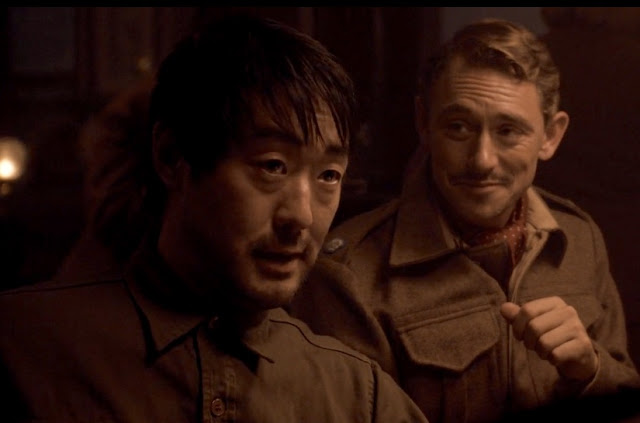

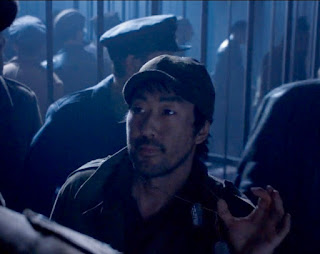
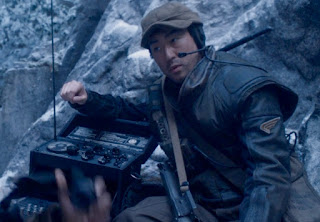
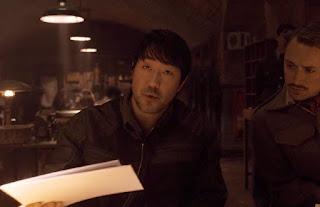
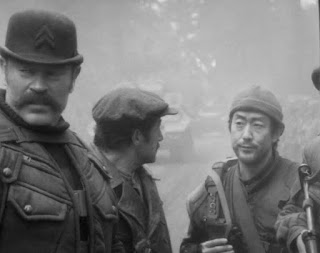
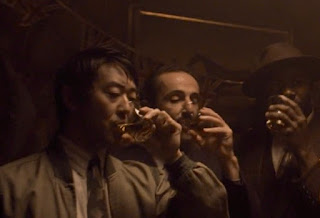
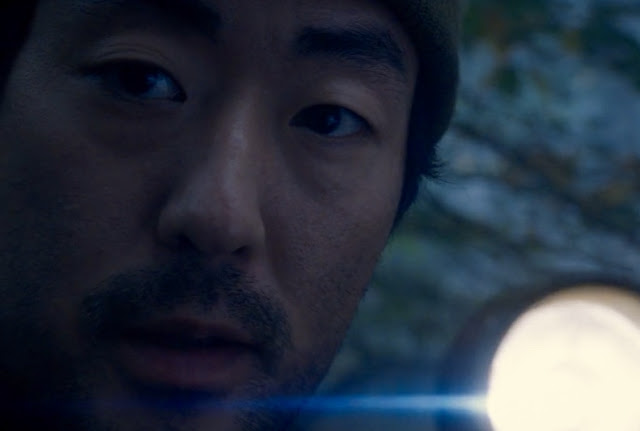
escort services kolkata
ReplyDeleteescort girl in kolkata
kolkata escort girl
escort girls kolkata
scort service in ultadanga kolkata
girls escort service of kolkata
kolkata escort girl night
escort service girl phone number kolkata
escort service phone number in kolkata sobhabazar
bengali escort service kolkata
best escort girls contact in kolkata
busty indian housewives escort kolkata
cheap escort service kolkata
escort girl kolkata ph number
escort service shyam bazar phone number kolkata
ESCORT SERVICE KOLKATA
ReplyDeleteKOLKATA VIP ESCORTS
KOLKATA HIGH PROFILE ESCORTS
KOLKATA COLLEGE ESCORTS
KOLKATA INDEPENDENT MODEL ESCORTS
KOLKATA CALL GIRLS ESCORTS
KOLKATA CHEEP ESCORTS
KOLKATA CALL GIRLS NUMBER ESCORTS
KOLKATA HIGH PROFILE ESCORTS
KOLKATA AIRHOSTESS ESCORTS
KOLKATA PARK HOTEL ESCORTS
KOLKATA PARK HOTEL ESCORT
KOLKATA FIVE STAR ESCORT SERVICE
KOLKATA HOUSEWIFE ESCORT SERVICE
KOLKATA BOUDHI ESCORTS
INDEPENDNET ESCORT IN KOLKATA
KOLKATA ESCORT AGENCY
RUSSIAN ESCORT
RUSSIAN ESCORTS
RUSSIAN CALL GIRL
RUSSIAN CALL GIRLS
HOUSEWIFE ESCORT
HOUSEWIFE ESCORTS
HOUSEWIFE CALL GIRLS
HOUSEWIFE CALL GIRL
MODEL ESCORT
MODEL ESCORTS
COLLEGE CALL GIRL
COLLEGE CALL GIRLS
INDEPENDENT ESCORT SERVICE
INDEPENDENT ESCORTS SERVICE
INDEPENDENT ESCORTS SERVICES
INDEPENDENT CALL GIRL
INDEPENDENT CALL GIRLS
It involves degenerative changes in the intervertebral discs as well as bone
ReplyDeleteMusic Paradise Pro
MightyText
apa pool login
Err_Cache_Miss Error
In Marvel movies, Kamala Khan, the first superhero from Pakistan made history with her Ms. Marvel series. Furthermore, we are an experienced and insured janitors team providing Affordable Cleaning Services in Fort Worth TX, and surrounding areas.
ReplyDelete